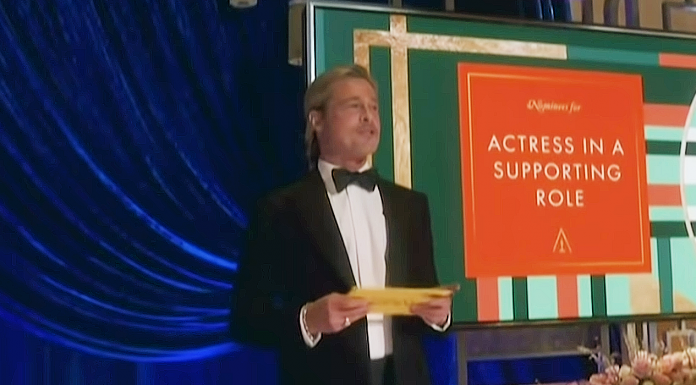After the 2020 Academy Awards spurred reports of an “all-time low” last year with a mere 23.6 million viewers, Sunday’s 2021 ceremony shattered that dubious record, dropping by 58% to a mere 9.85 million viewers.
The effect of the pandemic—which prevented moviegoers from regularly attending theaters—and the continuing rise of at-home streaming services like Netflix were undoubtedly part of the reason.
While the show was able to overcome the hurdles of California’s longtime lock-down restrictions—which Gov. Gavin Newsom recently lifted while facing a likely recall—celebrities still were expected to virtue-signal over the recommended social-distancing measures.
Last year’s best supporting actor winner, Brad Pitt, notably refused to kiss this year’s best supporting actress, Minari‘s Youn Yuh-jung, during her acceptance speech.
Public yearning for Hollywood glitz and glamor has also dissipated considerably during the yearlong hiatus.
The nominations garnered little interest due to the dearth of big blockbusters or even buzzworthy performances, with only a few exceptions.
Among those was Glenn Close, whose unique turn as the grandmother of conservative author JD Vance in the autobiographical Hillbilly Elegy spurred many conversations but resulted in her eighth lifetime Oscar snub after the loss to Youn.
With the rise of cancel culture, concerns about political correctness have further helped to shift the national mood away from celebrating Tinseltown’s privileged elite class of limousine leftists.
The awards broke their traditional format with a host-less show following recent controversies in which comedic show emcees were criticized for their controversial tweets.
Instead of the humor, showrunner Steven Soderbergh made the questionable decision to allow extra time for award recipients to speechify about their social causes of choice.
According to the reports of those who watched the telecast, many availed themselves of the opportunity to do just that, leading to what undoubtedly was a night of insufferable, sanctimonious preaching without the usual levity.
The Oscars’ pointed decision to change selection standards to be more inclusive for foreign recipients and people of color also drew criticism that the awards no longer reflected cinematic meritocracy.
Amid months of nationwide social-justice activism and grandstanding, while still grappling with race riots following a spate of recent police shootings, it was all but expected that black-centric productions such as Judas and the Black Messiah and Ma Rainey’s Black Bottom would run the categories.
The latter garnered a posthumous best actor nomination for Black Panther star Chadwick Boseman.
However, outraging the few viewers who did tune in to see Boseman be recognized, the award went instead to Anthony Hopkins, who was not present either in person or via satellite to accept it, resulting in an abrupt and anticlimactic ending.
Hopkins later recorded an acceptance speech in which he paid tribute to Boseman and admitted that he did not expect to win.
The Oscar plunge is the latest indication that pop-culture’s obsessive embrace of PC activism is past its tipping point.
Many sporting events and other awards shows have seen similar drops over the past year as viewers make known their distaste for celebrities engaging in political advocacy.
Likewise, Saturday Night Live, a late-night comedy show once at the forefront of edgy youth culture, has pulled in a shade of its former viewership with an aggressively political emphasis that lacks any obvious attempt at humor.
The show, which once drew weekly audiences of around 25 to 30 million viewers, is now stuck at a fraction of that, with a recent all-time low of 3.6 million.
For comparison, that is roughly the same number of viewers that Tucker Carlson, who currently leads the prime-time lineup of Fox News, receives for his nightly broadcast.

